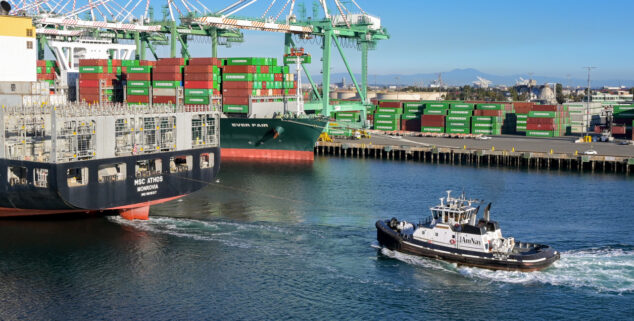Opinion
CARB’s new harbor craft rule could put California under water
 Los Angeles, California, USA - 12 January 2024: Empty container ship MSC Athos being assisted by a tug boat to enter the port of Los Angeles. Image by Ceri Breeze
Los Angeles, California, USA - 12 January 2024: Empty container ship MSC Athos being assisted by a tug boat to enter the port of Los Angeles. Image by Ceri BreezeOPINION – California’s approach to environmental regulations must balance immediate effects with long-term consequences. Recent California Air Resources Board (CARB) amendments to the Commercial Harbor Craft Rule highlight the need for this balance. These amendments, if unaltered, pose significant risks to mariners’ safety and affect California’s maritime projects. Fortunately, Assemblymember Dr. Jasmeet Bains’ AB 1122 offers a pragmatic solution.
CARB’s regulations will force tugboats, towboats, barges and dredges in the state to use Diesel Particulate Filters (DPFs), in an attempt to lower the state’s port emissions. However, the U.S. Coast Guard states the rules present safety issues and found that there are currently limited options, or no options in some cases, for safely retrofitting most vessels with DPFs. Indeed, DPFs have an alarming track record. When CARB mandated semi-trucks use DPFs, they caused raging wildfires.
Malfunctioning DPFs have endangered the lives of truckers and people near failing equipment and caused millions of dollars in property damage. This problem is significantly increased because marine engines operate at lower speeds, requiring higher burn-off temperatures—up to 1,500 degrees, per the Coast Guard, which has warned about these risks since 2021.
The prohibitive costs of retrofitting engines and the inherent fire hazards pose significant threats to mariners’ safety. Forcing the installation of unsafe DPFs on Coast Guard-regulated vessels could drive people out of business due to the safety risks and high costs. AB 1122 ensures that the CARB aligns with federal equipment safety protocols, addressing the most dangerous components of its regulations while creating a pathway for lowering port emissions.
AB 1122 does not tell CARB what it can and cannot do. This simply requires CARB to wait for the Coast Guard to give operators the approval and confidence they need that these DPFs are not dangerous.
The dredging and marine construction sector is urgently awaiting this bill to pass. The industry relies on a variety of vessels and equipment, including survey boats, tenders, hoppers, cutter suction, mechanical clam shells, boosters, scows, and other barges. Dredging is crucial for California’s economy, enabling ports to accommodate larger ships. West Coast ports will struggle to remain competitive without the ability to safely and cost-effectively expand shipping channels.
Operators do not want to place our mariners in danger due to technology that has been proven to be unsafe. We are also not in favor of installing DPFs on Coast Guard-regulated vessels – equipment unaccepted by our industry’s primary safety regulator. This could force vessel owners and operators in California to leave the industry due to the safety concerns and substantial costs associated with CARB’s regulations.
This industry is nimble and at national security’s forefront. Nowhere is it more obvious than with the collision in Baltimore Harbor when the MV Dali crashed into the Francis Scott Key Bridge. Six workers tragically lost their lives. Commercial vessel traffic at one of America’s busiest ports ground to a halt. Even national security assets in Baltimore were stranded by the accident.
Within 24 hours, dredging survey boats were mapping the channel and seafloor. The largest clamshell bucket dredge in the Western Hemisphere spooled up its operations immediately. The two largest crane ships on the Eastern Seaboard were activated and arrived in Baltimore within days. The effort was remarkable – channels were surveyed and cleared within three weeks—allowing for a large segment of vessel traffic. All of this labor came from mariners on commercial harbor craft.
Putting mariner lives at risk is unconscionable. AB 1122 has had unanimous support in the California Senate Transportation Committee and the Senate Environmental Quality Committee. In the coming weeks, lawmakers will weigh the bill further in appropriations and the entire Assembly will vote on it. The maritime industry and stakeholders across California are carefully monitoring how this proceeds.
William P. Doyle is the Chief Executive Officer of the Dredging Contractors of America and former Executive Director of the Port of Baltimore
Want to see more stories like this? Sign up for The Roundup, the free daily newsletter about California politics from the editors of Capitol Weekly. Stay up to date on the news you need to know.
Sign up below, then look for a confirmation email in your inbox.

Leave a Reply